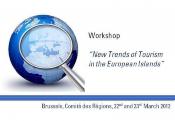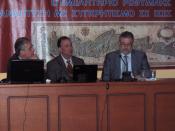 |
| |
 |
 |
 |
 |
 |
 |
 |
 |
 |
 |
| European Parliament initiative on regional airport adopted |
 |
The report seeking to redress a balance between regional and international aviation, was adopted by the transport committee of the European Parliament on the 27th of March 2012.
It addresses a wide scope of issues relating to air transport: from the revision of the definition of a regional airport to States aids.
Most of the MEPs agree on the need to revise the definition of regional airport and share the same opinion: the current definition, based on figures strictly, is irrelevant. They agree on a definition that takes into account the specific services and the different types of connections regional airports can provide decided to exclude airports whose principal catchment area is a capital city and to distinguish between major and minor non-hub airports.
Regarding State aids, direct and indirect public aids to airports infrastructures and air companies can be accepted but a balance needed to be found between the amount of the aids and their duration as well as between the advantages provided for the region by the airports and their functioning costs. The main fear of the European commission is the absence of concurrency, especially in islands where we count sometime only one single air company. Then the company enjoys a monopole and benefit from public subsidies while not offering a public service. Thus it is important to prevent divergent interests between the region and the air companies as it happened with the “single cabin luggage policy” which turned users away from buying products in duty-free shops of the airport and incited them to buy products in the plane.
The green MEPs, not in favor of this initiative, ask why non-profitable railways are closed while non-profitable airways are supported.
 |
|
|
 |
 |
 |
 |
 |
 |
 |
 |
On the 22nd and 23rd of March 2012, the OTIE workshop on new trends of tourism in European islands took place at the Comité des Région, in Brussels. While the dozen of speakers invited focused their interventions on very differing topics, all of them emphasized the need for differentiation in European islands tourism. In the current context the “sun and beach” model is no more adapted to the demand. On the contrary each island would have to provide a unique and specific experience.
In their view, this differentiation through specialization is the best way for European islands to survive in what had been called by the speakers “a competitive ocean”. As a result, islands would have to change the marketing of their territories toward a more sophisticated promotion by enhancing the diversity of their activities, traditions and landscapes. Speakers asserted that it is crucial to think beyond the European islands’ traditional schemes and to redefine the kind of targets aimed (culture or food tourism, health or green tourism, adults with or without children; young or old, mobile or sedentary people etc.) In order to determine clearly the needs of the population coming (cultural, age and economic constraints) and to develop efficient plans, the establishment of a solid data base is fundamental as well as a better inclusion of the islands residents.
See OTIE website
|
 |
 |
 |
 |
 |
 |
 |
 |
 |
 |
This Conference has been organized by the CCI of Rethymno, Lead Partner of SMILIES (Small Mediterranean Insular Light Industries Enhancement and Support) project, a Project co-financed by European Regional Development Fund –ERDF under MED programme. (see the website)
The event gathered representatives of MED Programme, of the Region of Crete, of Cyprus, of Sicily and France, INSULEUR, EEN, prized entrepreneurs from Greece, Cyprus and Italy and the partners of SMILIES.
Mr. George Benetos, President of the Professional Chamber of Pireaus and Treasurer of INSULEUR made an intervention on the role of INSULEUR to capitalise and collaborate on specific regional policies for EU islands and George Asonitis, Member of Technical Committee of INSULEUR presented INNONAUTICs project and possible ways of collaboration with SMILIES on capitalization.
During more than one year SMILIES partners and their experts have supported and coached on the field 100 pilots in MED islands, helping their promoters to develop their business project. Projects covered a wide variety of fields: renewable energies production, waste recycling and valorization, water management, electric cars development, new eco-building materials production, new types of boats, agrofood industries, fashion industries and the valorization of natural and cultural heritage through innovative ICT applications. A sample of the best of them was present to present their SMILIES experience and received SMILIES Awards.
SMILIES lesson out of this experience is that a new kind of innovation emerges which is different from the “innovation” we have seen in policies to date. It is an innovation carried out less by single individuals or companies but rather working across boundaries to link ideas and businesses to form an embedded system, which builds new social links and transforms innovative ideas in collective projects, making them not only possible but attractive and retributive.
|
 |
 |
 |
 |
 |
 |
 |
 |
 |
 |
 |  |
A consultation had been opened (from mid-March until the 11th of May 2012) in order to improve the “blue growth strategy” by identifying the main challenges, highlighting synergies between sectorial policies, studying interactions between the different activities and their potential impact on the marine environment and biodiversity and by identifying activities with high growth potential in the long term. By basing growth on the maritime sector, this strategy involves directly the European insular regions.
"Blue growth" is a long-term strategy to support growth in the maritime sector (short-sea shipping, coastal tourism, offshore wind energy, desalination, use of marine resources in the pharmaceutical and cosmetics industries). Maria Damanaki, Commissioner in charge of maritime affairs and fisheries, explains: "Europe urgently needs new far-sighted strands of smart, sustainable and inclusive growth in a new low-carbon 'blue economy'. Emerging maritime industries have every chance to become one of the pillars of Europe 2020 strategy for growth and jobs.” (EC Press release, 25 November 2011)
This consultation is a great opportunity to make your voice heard! Thus, do not hesitate to take part in it:click here.
|
 |
 |
 |
 |
|
 |
 |
 |
 |
|
For more information:
InsulerVoice Coordinator: Silvia Delgado |´ innovacionmallorca@camaras.org | Tel: +34 971 71 01 88
Antonio Cañellas | crmallorca@camaras.org | Tel: +34 971 710188
INSULEUR representative to the EU in Brussels: Carine Piaguet | c.piaguet@acfci.cci.fr | Tel: +32 2 2210434
INSULEURVOICE is powered by: INSULEUR & Mallorca Chamber of Commerce, Industry and Navigation
|
|
|
 |
 |
 |
 |
|
 |



